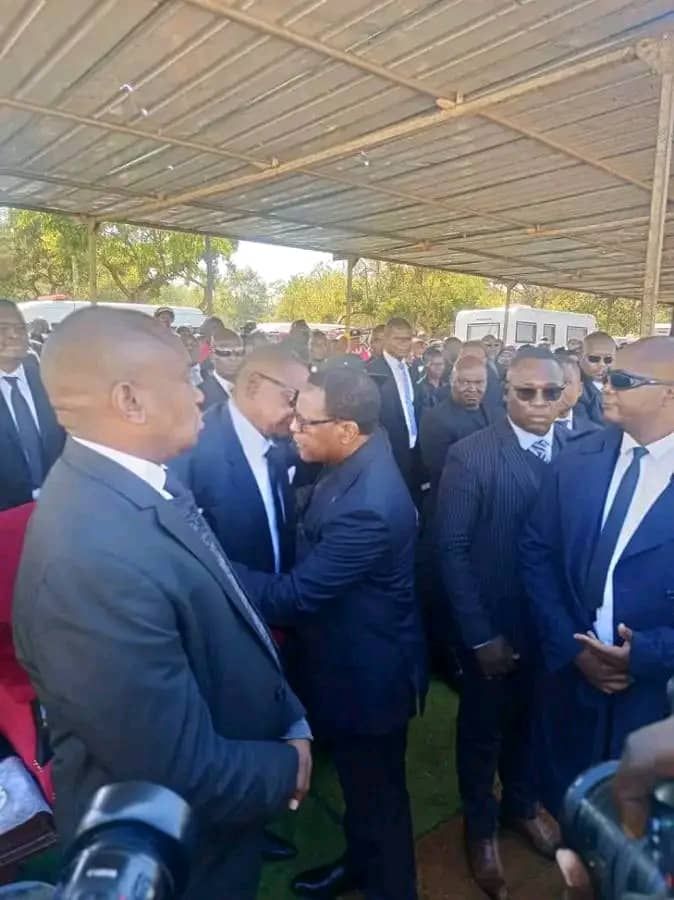By Twink Jones Gadama
Malawi’s political landscape has been marked by a intriguing dynamic between President Lazarus Chakwera and his predecessor, Professor Arthur Peter Mutharika. Despite transitioning out of office, Mutharika’s influence and legacy continue to cast a long shadow, seemingly unsettling President Chakwera.
This essay explores the reasons behind Chakwera’s apparent fear of Mutharika, examining the political, historical, and personal factors at play.
Political Rivalry and Legitimacy
Chakwera’s fear of Mutharika stems from their intense political rivalry, which dates back to the 2019 presidential election.
Mutharika’s defeat and subsequent handing over of power to Chakwera have not diminished his political clout.
Chakwera may perceive Mutharika’s continued influence as a threat to his own legitimacy, fearing that the former president’s enduring popularity could undermine his authority.

Policy and Ideological Differences
The two leaders represent different political ideologies, with Mutharika’s Democratic Progressive Party (DPP) generally associated with a more liberal approach, while Chakwera’s Malawi Congress Party (MCP) is seen as more conservative.
Chakwera may fear that Mutharika’s policies and ideas could gain traction, challenging his own agenda and political stance.
Historical Significance and Legacy
Mutharika’s presidency was marked by significant economic and infrastructure development, leaving a lasting legacy that Chakwera may struggle to match.
The former president’s achievements in areas like road construction, energy development, and social welfare programs have cemented his reputation as a transformative leader.
Chakwera may fear being overshadowed by Mutharika’s accomplishments and struggle to establish his own distinct legacy.
Personal Animosity and Ego
Personal differences and ego may also contribute to Chakwera’s apprehension towards Mutharika.
The two leaders have engaged in public verbal spats, with Chakwera accusing Mutharika of meddling in his government’s affairs,a claim that is unfounded and baseless as Peter Mutharika has never meddled in the affairs of chakwera’s government.
This personal animosity could fuel Chakwera’s fear of being outmaneuvered or upstaged by his predecessor.
Despite Chakwera’s efforts to establish his own legacy, several factors suggest that Mutharika may emerge victorious in next year’s elections:
Unwavering Support Base
Mutharika’s DPP enjoys a strong and loyal support base, particularly in the southern region of Malawi.
His party has maintained a robust grassroots structure, which has helped sustain his popularity even after leaving office.
Policy Reversals
Chakwera’s government has reversed some of Mutharika’s key policies, which may have alienated some voters who benefited from the former president’s initiatives.
This reversal may lead to a resurgence of support for Mutharika’s DPP.
Economic Woes
Malawi’s economy has struggled under Chakwera’s leadership, with rising inflation, a weak currency, and stagnant growth.
Mutharika’s economic achievements during his presidency may appeal to voters seeking a return to stability and progress.
Leadership Style
Mutharika is perceived by many as a strong and decisive leader, whereas Chakwera’s leadership style has been criticized for being indecisive and ineffective.
This perception may sway voters in favor of Mutharika’s authoritative approach.
Opposition Unity
The opposition parties, including the DPP, have shown signs of unity and cooperation, which could bolster Mutharika’s chances of winning.
A united opposition front may attract voters seeking a viable alternative to Chakwera’s government.
While Chakwera’s fear of Mutharika is understandable, the former president’s enduring influence, policy achievements, and strong support base may ultimately lead to his victory in next year’s elections.
Chakwera must address the underlying concerns driving his fear and focus on delivering tangible results to secure his own legacy and re-election.
Conclusion
President Chakwera’s fear of former President Mutharika is rooted in a complex mix of political, historical, and personal factors.
As Chakwera navigates the challenges of leadership, he must confront and address these underlying concerns to establish his own legacy and solidify his position as Malawi’s leader.
By doing so, he can move beyond the shadow of his predecessor and forge a distinct path forward for the nation.


